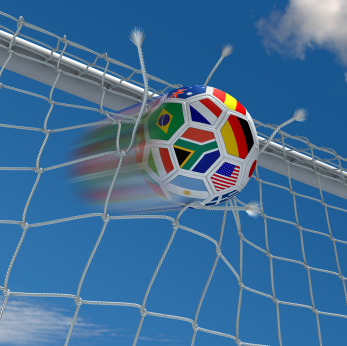As USA Women's World Cup soccer team continues group play with a game against Sweden, athletic trainer Ralph Reiff, ATC, MEd, director of St. Vincent Sports Performance in Indianapolis and former manager of athlete care for the 1996 Olympic Games,
offers some important tips for soccer parents to help their kids safe and injury-free:
- Acclimatization. Soccer requires tremendous fitness, says Reiff, so make sure your child:
- Starts slowly to get into shape to play the sport Don't let your daughter go from sitting at home and watching TV to jumping on the field without proper preparation;

- Starts with short spurts of activity followed rest to allow her body to adapt over a seven- to 10-day period to adapt to length of play and weather conditions, especially in hot, humid and/or sunny summer weather;
- To help avoid the risk of heat illness, if your child doesn't feel well, have her back off and seek medical attention.
- Starts slowly to get into shape to play the sport Don't let your daughter go from sitting at home and watching TV to jumping on the field without proper preparation;
- Proper warm ups and cool downs: "My definition of warming up for soccer is to take your standard heart rate and increase it to a comfortable level," says Reiff.
- Jumping, running at a good pace or doing a series of ground-based exercises that include pushups, sit ups and kicking the ball around are all good activities.
- When your child's heart rate increases, have her stop and slow down to let her heart rate recover back to a level of readiness, which can vary depending on her initial level of fitness and activity.
- Add light jogging, leg and arm swings at a moderate pace to activate or "turn on" her muscles.
- At that point, she is ready to play the game, so that the warm up and game time blend together.
- Cool down prepares her body for the next activity and sets the stage for how she is going to feel and perform tomorrow when she comes back to the field or engages in other physical activities. Cooling down allows her muscles to calm down after being excited and activated. Her body, heart and muscles return to a steady and normal state of rest. Repeat some of the exercises she does in the warm up, suggests Reiff. The body will get into a pattern or rhythm of calming down. She will feel better when at rest and not overly sore or at risk of injury by allowing herself to slowly get to a steady state of rest.
- Be head smart: Abby Wambach may be famous for making game-winning headers, but she's developed experience and skill to do so, says Reiff. Headers are a standard play in soccer both defensively and offensively. There is a proper way to head the ball to lessen incident of an injury or concussion. Learning proper technique is vital. Your daughter should seek the advice of a coach, athletic trainer or other sports or medical expert to master this skill.
- Reduce risk of ACL injuries: Studies have shown that the incidence of ACL, ankle or other lower extremity injuries, particularly in girls, can be reduced through proper conditioning, agility exercises, increased core strength, improved posture and learning how to land appropriately. Girls are eight times more likely than boys to tear an ACL, according to the Center for Injury Research and Policy at Nationwide Children's Hospital in Columbus, Ohio.
- Proper hydration and nutrition are important too: Fuel the body with the right type and correct portions of food and at the right time of day every day, advises Reiff. Hydration, he says, is the lubricant for the body and is what makes muscles work appropriately and allows the body to cool itself and maintain temperature control. "Most athletes come to practices or games improperly hydrated," comments Reiff. If your daughter thinks she is drinking enough, she may not be. A good rule of thumb is to check hydration status through the color of her urine. Lemonade color is good; apple juice color means she is dehydrated. Start with 12 ounces of water each morning.
- Sleep and rest: Sleep is vital for muscle recovery and future activity; we all need to make sure to get enough of it to improve overall body functions and for mental health and stress reduction. Make sure proper sleep is part of your daughter's plan. Take rest breaks during the day and during activity to allow the body to recover after an exercise activity. Make sure she listens to her body. If she is winded and tired, have her take a break. If she feels a pull, strain or injury, make sure she seeks professional help.
"Finding balance in any sport is critical to success," says Reiff. The World Cup elevates the game of soccer at this time of year. Though we all can't be elite athletes on the universal stage, people of all ages and walks of life should be able to enjoy the game, to leave wanting to return tomorrow and to know this sport in particular can provide a lifetime of activity, movement and fun."
Source: National Athletic Trainers' Association
Posted July 14, 2011; updated June 9, 2015








